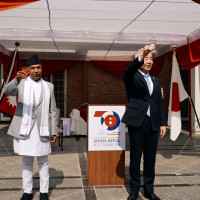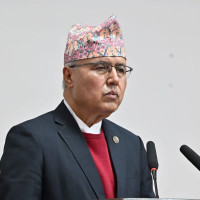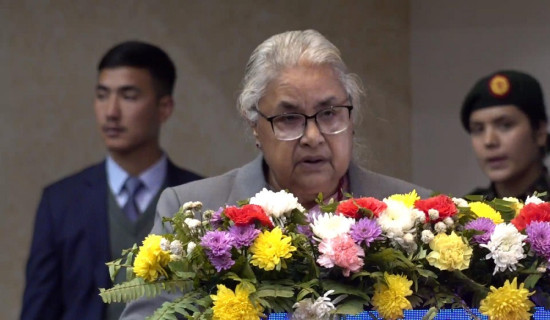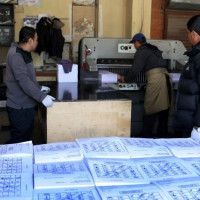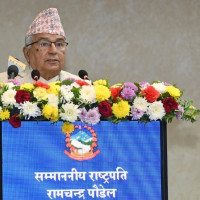- Thursday, 12 February 2026
Economists urge cut in recurrent spendinding for FY 2025/26
Kathmandu, Apr. 29: While the government is preparing budget for the next fiscal year, economists have suggested the government to prioritise reducing recurrent expenditure in the upcoming fiscal budget.
Experts argue that the current trend of high recurrent spending—primarily used for salaries, allowances, and administrative costs—has left limited room for capital investment, essential for long-term economic growth.
"Recurrent expenses are inflating every year, leaving little fiscal space for infrastructure and development projects," said economist Dr. Chandra Mani Adhikari. "The next budget must reflect fiscal discipline and reallocation towards productive sectors."
According to him, the recurrent expenditure should be reduced at least by 20 per cent from the present allocation.
"Through the budget arrangement, the government should reduce foreign visits and expenditure on vehicles and fuel, reduce the number of advisors to the Prime Minister, ministers and other high-ranking officials and their secretariats," he said.
He also said that boards and offices such as the Nepal Shipping Office that are not operational should be scrapped to reduce recurrent expenditure.
Economist Keshab Acharya said that the federal government should adopt a strategy to reduce expenditure from the upcoming fiscal year.
"There is a need for restructuring the federal government. Restructuring of the government will definitely help reduce the budget allocation for recurrent expenditure and help implement the budget. The recurrent expenditure should be reduced at least by Rs. 100 billion from the present allocation," he said.
Currently, more than 60 per cent of the total budget allocation is under recurrent expenditure and only 19 per cent is under the capital budget heading.
Reducing recurrent expenditure will reduce the burden of raising public debt to cover even recurrent expenses and ultimately reduce the pressure to repay principal and interest," Adhikari said.
Economist Acharya said that it is a must to digitise the distribution of social security, including senior citizen allowance, single women allowance, pension which controls duplication of social security allowance distribution and reduces cost as well.
He suggested the government to focus on allocating required budget with priority to the selective national pride projects to complete them within 3-4 years.
"Currently, there are 27 national pride projects and the government is allocating little budget for them. Therefore, political parties and parliamentarians should have an in-depth discussion on the national pride projects and select a limited number of projects based on priority and contribution to economic growth. Doing so will ensure that these projects are allocated the necessary budget and complete in time," Acharya told The Rising Nepal.
He said that the government should decide in time which and what kind of projects will be built with domestic investment and through foreign direct investment.
"For this, the project should be demonstrated with a detailed project report. If the DPR is completed, the project should be sent into implementation as soon as the government releases the budget and even if it is built with foreign investment, investors will also be able to implement the project on time," he said.
Budget size should not cross Rs. 1,700 billion
Talking about the size of budget, Dr. Adhikari said that the government should be sincere to introduce implementable and realistic budget instead of a large one.
"Analysing the resources, especially revenue, which is a major source of government's income, it will be appropriate and realistic to introduce a budget of around Rs. 1,700 billion. If the government proposes more than that size, the budget will not be implemented properly and increase recurrent expenses that ultimately leads to inflation," he said.
The National Planning Commission has fixed the budget ceiling at around Rs. 1.9 trillion for the fiscal year 2025/26.
The budget size should be determined based on the resources, implementation capacity and economy instead of basing only on demand, said Acharya.
If the budget is introduced based on the demand proposed by the ministries, the size of the budget would be more than Rs. 3,000 billion, he said.
"Considering the government spending capabilities and resources, in my view, the budget for the upcoming fiscal year 2025/26 should not exceed Rs. 1,600 billion," he said.
The government should not include pipeline and less important projects in the budget which helps to overcome the shortfall of budget while implementing the present priority projects, he said.
Adopt policy to increase demand, production
Dr. Adhikari said that the government should come up with a policy to solve the problems of cooperatives and improve the payment system by bringing incentive packages for well-run cooperatives.
Stating that there is a problem in overall demand and economic activities in the economy due to sluggishness in real estate transaction and problems seen in the cooperatives, he said that the budget should pay attention to ease the real estate transactions.
He said that the government should accelerate the activities of cooperative organisations by establishing a special fund and disbursing money through the budget.
He said that the cessation of transactions in cooperatives will directly affect economic activities including consumption and the banking sector.
The domestic economy will not accelerate until and unless demands peak up, he said and added it was a must to create employment and increase expenditure for infrastructure to accelerate economic activities, he said.
To increase agricultural production, the government should introduce production-based incentives to encourage farmers to increase production.
Similarly, through the budget, the government should introduce special programmes in the country's potential investment sector, such as hydropower, tourism and manufacturing industries as well.
Restructure taxation
Economist Acharya stressed the need of restructuring the tax system through the budget for the coming fiscal year.
Among South Asian countries, high taxes in Nepal are affecting foreign direct investment commitments, he said, and added that taxes should be reduced to attract investment.
"Until a few years ago, taxes in Nepal were limited to 25 per cent, while in South Asia they were more than 30 per cent. However, South Asian countries have reduced taxes to 20 per cent, while in Nepal, taxes have increased to more than 36 per cent, he said.
He said that taxation should be gradually decreased by widening the tax net.
President of Nepal Chamber of Commerce Kamlesh Kumar Agrawal stressed on the need of reducing tax through the budget citing that high tax gives rise to illegal trade in Nepal.
"The government should impose tax based on the neighbouring India which helps control illegal trade. Likewise, multiple Value Added Taxes should be implemented," he said.
He said that the government should adopt flexible income tax policy in the next budget.




